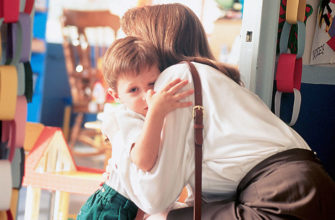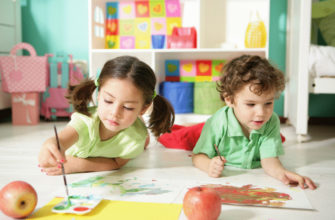Your child has grown up and it is time to go to kindergarten. You talked with friends and acquaintances, consulted with your husband, and chose a suitable institution. And not far from home, and the reviews are good, and you liked the educators. The first weeks of adaptation passed, the child got used to it, met the children and even found a friend. And then, one fine day, like a bolt from the blue: “I do not want to go to kindergarten!"And so every morning. Crying, naughty, mom doesn’t let go of herself. No persuasion from educators helps. You have to force the baby into the group, close the door and just run away. Mom has a panic, the child is hysterical. What to do? Is your baby not “sadovskiy”?
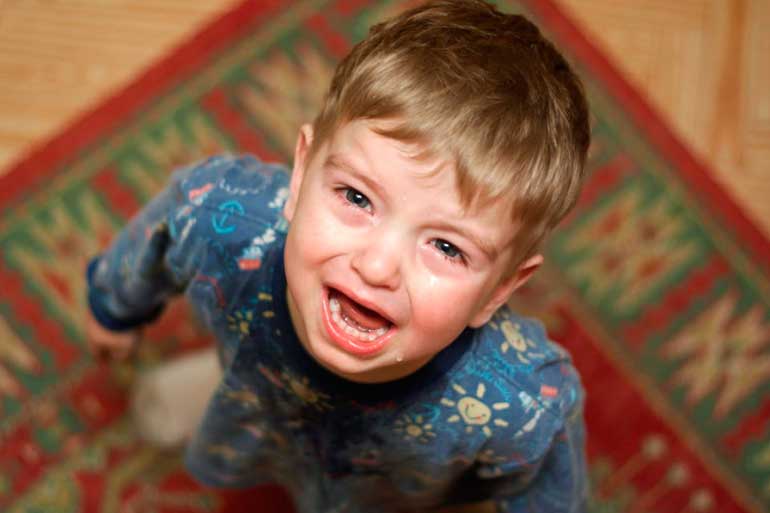
Specialists who know the internal specifics of the kindergarten, understand that the period of adaptation rarely goes painlessly. Indeed, when a child first falls into the walls of an institution, he finds himself in an unfamiliar environment: these are new people, the constant noise and running around of children, all this affects the psycho-emotional state of the baby. Even an adult coming to a new place of work feels uncomfortable. Imagine how it happens to a little man who, except close ones, did not communicate with anyone. And suddenly he is brought into an unfamiliar room and his mother leaves. Yes, even early waking up, a new regime of the day, classes. From such changes, even an adult will go round and round! During this period, the child really needs the support and understanding of the parents. Let's figure out what can cause the baby anxiety and how to help him.
According to many experts, the period of adaptation to kindergarten on average takes six months.
She promised you won’t give up, she said - I’m good
Daily separation from mother affects a young child very much. All day in kindergarten, with unfamiliar people cause anxiety and anxiety. The state of stress intensifies when evening approaches.The kid constantly looks out the window or door, hoping to see his mother. And if they start taking other children, but they don’t come for him, the nervous tension increases. What if they forget about me? But what if mom doesn't love me anymore? The situation is complicated if a younger brother or sister appears in the family. The kid may think that his parents have found a replacement, they no longer love him, he bothers everyone and they do not need him.
The most important thing in a child’s life is the feeling of your love.
How to do the right thing
What to do if a newborn appears in the family? Many parents at the birth of their second child try to attach an already grown first-born to a kindergarten. He is already big enough, will communicate with children, and it will be easier for mom. Before making such a decision, think carefully. Your baby already suffers from the fact that he began to pay less attention. If, during this period, send him to kindergarten, he will decide that you no longer need and you do not love him. If there is such a need, try to do it before the birth of the second child, so that the baby has time to adapt to new conditions. Surround the baby with attention and affection, often kiss and hug him. The kid should feel that he is loved and being in kindergarten is just a necessary necessity, and not an attempt to get rid of him.
In the evening, after kindergarten, try to spend more time with the child. Let him feel that you are bored and still love him. Do not dismiss him when he wants to talk to you. Let him talk about his small victories or discoveries, about what he did in kindergarten. Tell us about how you yourself went to kindergarten as a child. Emphasize that you felt so good and loved to go there.
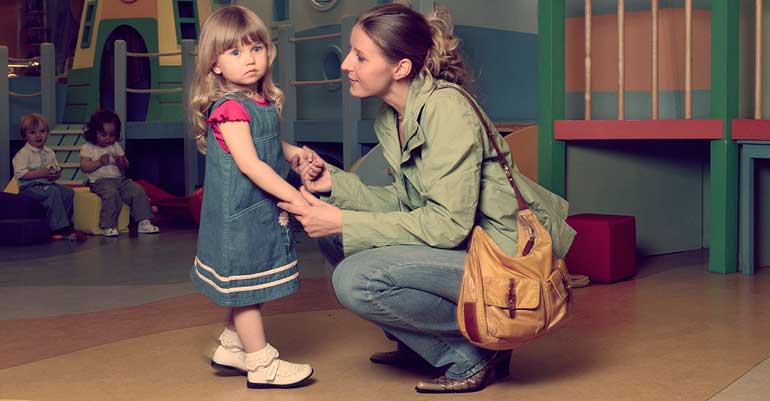
In no case do not speak negatively about educators, praise them, talk about how affectionate and caring they are. In the period of addiction, take your favorite baby toy to the kindergarten. This small part of the house will help the baby to cope with anxiety and anxiety, make falling asleep more comfortable and calm during the day. Saying goodbye in the morning, say that you will return, "when the sun sets and begins to get dark," or say: "You will sleep, then eat, and right after that I will come." At the age of three, the characteristics of “evening” or “after work” are too vague and still not very clear to children, so try to speak more simply. It is important to remember: if promised, be sure to comply.
Reassure your child that kindergarten is the place where the best children go. Tell the baby that he is already an adult and should be engaged in adult affairs in the kindergarten: listen carefully in the classroom of the educator, make friends with children, learn the rules of behavior. In no case do not threaten the guilty minx that you will take him to kindergarten. A preschool should not become a place of serving offenses. At home, give your child support, participate in all his endeavors, and be the best friend.
Children's pranks, moods, anxieties and anxieties on the way to kindergarten - this is a hidden question: “Do you love me?”, Requiring confirmation.
Do not exaggerate the virtues of kindergarten. Do not fool a child
Before the first visit to the kindergarten, parents tell the children that this is a cute house for the kids, full of toys. Children there have fun, have fun, play with each other, arrange holidays for them. A true childhood corner, the dream of every child! And what actually awaits the child: daily routine, educators, discipline, classes. Did parents tell about this? This is the first disappointment ...
How to explain correctly
When preparing a child for kindergarten, do not create unnecessary illusions in his image. Explain that it is already large and kindergarten is a new step in independent life. Only smart and responsible kids who are not afraid of difficulties go to kindergarten. In order to learn something new and interesting, you need to try. Assure the baby that he will succeed.It is impossible for the child to see that you are worried about him. In the evenings, do not arrange for him to interrogate about being in kindergarten: whether the children offend him, how the teacher swears and who they are, whether they force children to eat unloved porridge by force.
When leaving your child in kindergarten, try not to worry or worry. Excessive anxiety and excitement, even at a distance, can be transmitted to your child. Stay calm and calm in any situation. The problem of adaptation should not be discussed in the presence of the child. Say that everything is fine, your kindergarten is the best, the teachers are the most attentive. Give your baby more affection and love. In the evening, set aside household chores and pay attention to the baby. Talk with him, rejoice at his successes and new skills, go to the park for a walk, read a book, and give a light massage. The child must feel that he is needed and loved.
The child does not know how to be friends with children
Your child is so active and cheerful at home, he wants to know everything, he is interested in everything. But once you cross the threshold of a kindergarten, it pinches and becomes boring and gloomy. Educators say that he is so good, obedient, does not run, does not fight, but does not show initiative. He sits in a corner and plays quietly with a toy brought from home. But how so? You know that he is not like that!
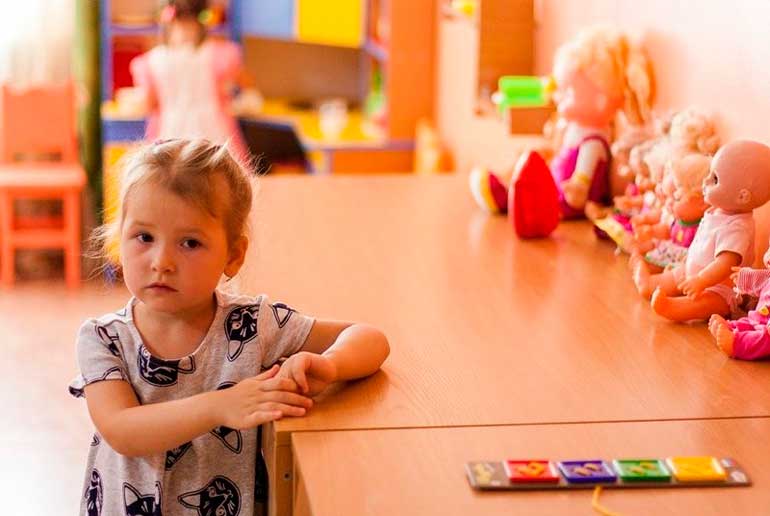
Most children at the age of three to four due to their nature and temperament still do not know how to find common contact with their peers, when they get into the team they go into themselves and become isolated. New acquaintances and impressions do not bring the baby joy, only new disappointments
A quiet and obedient child is not always good. Thus, children are expressed stress associated with significant changes in life. This circumstance cannot be ignored.
How to help baby
Before visiting the kindergarten, the family was surrounded by relatives and friends, helped him, supported, paid attention. He was constantly surrounded by care and attention. Arriving in a group, the baby was in a new environment with unfamiliar adults and children. It is difficult for even an adult to make contact with new people, let alone a child.
When picking up crumbs from the kindergarten, do not rush to go home. Take a walk around the playground, maybe there he will meet the children from his group and be able to get to know each other better. It is possible that you will be on the way, and on the way home the kids will get closer even more.
Talk with the child and ask which of the children in the group he likes best. Have a tea party on the weekend and invite these kids home. Go for a walk together. In many kindergartens, teachers recommend going to a kindergarten playground for several days before entering. You need to do this during a walk so that the child can take a closer look and get acquainted with the children from the group where he will go.
When surrounded by other children, pay attention to how your child behaves. Does he try to get to know his peers, talk to them, play, or retire, lock himself in, conflict.
Teach your child to say hello, be polite and cultured, offer children their toys, ask permission to play with them, respond correctly to refusal, finding a compromise. Give your child sweets and offer to treat other children.
Try to spend more time on playgrounds, parks, attractions. Learn from the baby the names of the children, ask which of the group he likes, with whom he can find a common language, and with whom it does not work out yet. Feeling mother’s support, her love and care, the child will be more confident and staying in the new team will become much more comfortable.
It is enough to help the child find several friends, and the situation will recover for the better.
Unsure child
A child’s success is often associated with hidden fears and insecurity. In a seemingly calm baby, a storm of emotions can boil inside, which can harm the children's psyche.A child may be afraid that something will not work out for him, because a lot is required of him. Once in the team, children cannot immediately get used to the fact that so many curious eyes are watching him. When responding to classes or completing a task, the child begins to get lost and sometimes cannot fulfill the elementary assignment.
Coming home, the baby can make a real tantrum because of a small blot, correction, difficulty in memorizing verses or composing stories. He is afraid that his work will be bad, other children will do better and more accurately. It happens that a child learns a poem at home and tells it without hesitation. But when you need to tell in a group, he cannot utter a word. This situation is quite common not only in kindergarten children, but also among younger students. Kids are afraid of publicity, get lost and become self-contained, and a tantrum starts at home.
How to help gain confidence
The failures of the child should not be accompanied by your disappointment. When children are just beginning to learn something, some fear of failure is normal. Tell your child that this is a random misunderstanding and another time it will work out. It’s very difficult for a kid to adapt to new conditions and he needs time. He must learn to perform tasks and assignments in front of other children. Not every adult likes to watch his work. Immediately everything begins to fall out of hand and an elementary familiar thing does not work out.
The less you attach importance to the failures of the child, the less he will feel different from other children.
Try to be at all holidays in kindergarten. If a child has forgotten a word in a poem, feel free to tell him. Let the baby see and feel your support.
Talk with the teacher and ask that he be more tactful and gentle at least for the first time, do not note the shortcomings of the child in the presence of other children. When you come to kindergarten in the evening, pay attention to the exhibited crafts. Praise the child, say that he is smart and he succeeds. Take work home and arrange a small craft museum. When guests arrive, be sure to pay attention to children's work. The baby will be pleased and he will be sure that they appreciate him.
The child does not talk about life in kindergarten
You visit a kindergarten for several days, and the child becomes closed and taciturn, he has frequent tantrums and tears from scratch. On the way home he is silent, it is impossible to draw a word from him. This situation is quite common. The child needs help.
How to push the baby to talk
The new situation, strangers and separation from the mother negatively affect the children's psyche. Teaching a child to kindergarten, teachers advise not to give it immediately for the whole day. The first days you need to pick up the baby early. A whole day in a new team is too tiring for a little man. Let him get used to it and get used to it. In the middle of the week, it is advisable to arrange a day off, for example on Wednesday. Perhaps, having been at home and having a rest, the baby himself will be asked to see the children.

When picking up the child from the kindergarten, ask the teacher how the day went, what the child did, with whom he talked. If problems arise, try to solve them together with the teacher. If the baby complains, listen to him and try to understand. Ask suggestive questions that your child can answer “yes” or “no.” For example: “did you play with Sasha today?”, Or “did you build a house?” - If you recall in this way the events in the kindergarten, the child will most likely tell himself further about what he remembers. And having heard the question “How was your day?” or “How are you?”, the children are lost and cannot give a definite answer. The maximum that you hear is “good” or “normal”. This is the end of the conversation.
Try to play kindergarten with your child, arrange role-playing games. Let dolls and soft toys become your artists.Say that the bunny does not want to go to kindergarten, because it is afraid. The kid will begin to reproduce the events that he experienced in reality. Pay attention to how the toys behave. They play together or are seated in the corners, a bunny cries or laughs. This way you can learn something about the life of a child in a group. Let the baby take his favorite toy with him. In the evening, ask what the bear or bunny did, what they ate, how they slept, whether the teacher scolded him or praised him? Most likely, the child will tell about what he did himself. Playing the game, you can not only gather the necessary information, but also teach the baby how to communicate with peers. Using the example of a bunny, show how to get to know each other and start a conversation.
Such games are often the only way to learn something - not all children can and want to share their experiences with their parents.
Observe how the child communicates with the children and the caregiver. Do not ignore the baby's complaints about the teacher or other children. Take a look at how the teacher communicates with the children, with whom and how your baby plays. Come into the garden at “out of hours” - and if the child’s complaints are confirmed, and you were not able to influence the situation through conversations or games in the kindergarten, contact a psychologist.
If you feel that the crumbs had serious difficulties with the kindergarten, do not dismiss them. Do not let your child suffer and communicate with unpleasant people. In fact, kindergarten is the second home of the child, where he spends most of his time. The kid should have a desire to go there, his stay in a preschool should be comfortable. If the child is unable to establish contact with the children or you do not like the attitude of the teacher, then you should talk with the head. If this measure does not help, then there is only one way out - go to another kindergarten.
We also read:
- Adaptation of the child to kindergarten: what parents need to know
- If parents thought about the consequences of their actions: 4 examples of unsuccessful adaptation to kindergarten
- Mistakes of parents, because of which the child does not want to go to kindergarten
- The child does not want to go to kindergarten: what to do to parents
- The kid has problems in kindergarten - how parents can help the child
- 10 most popular parental fears of kindergarten
Video: What if the child does not want to go to kindergarten


